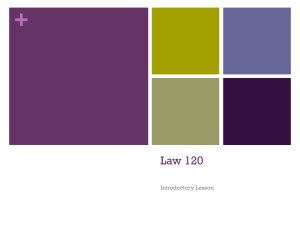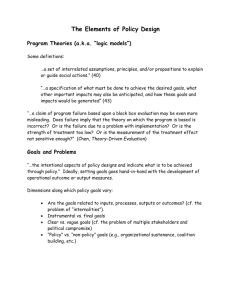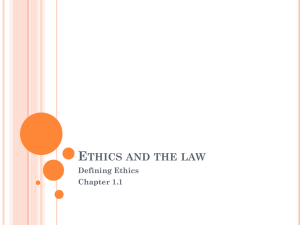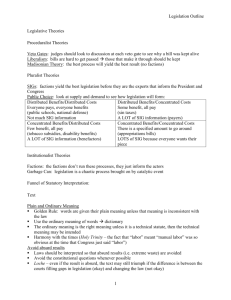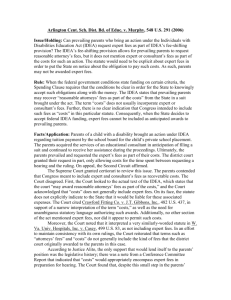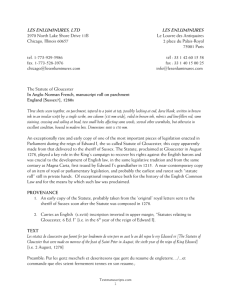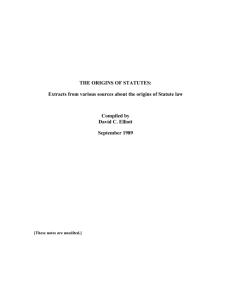Glossary of Legal Terms
advertisement
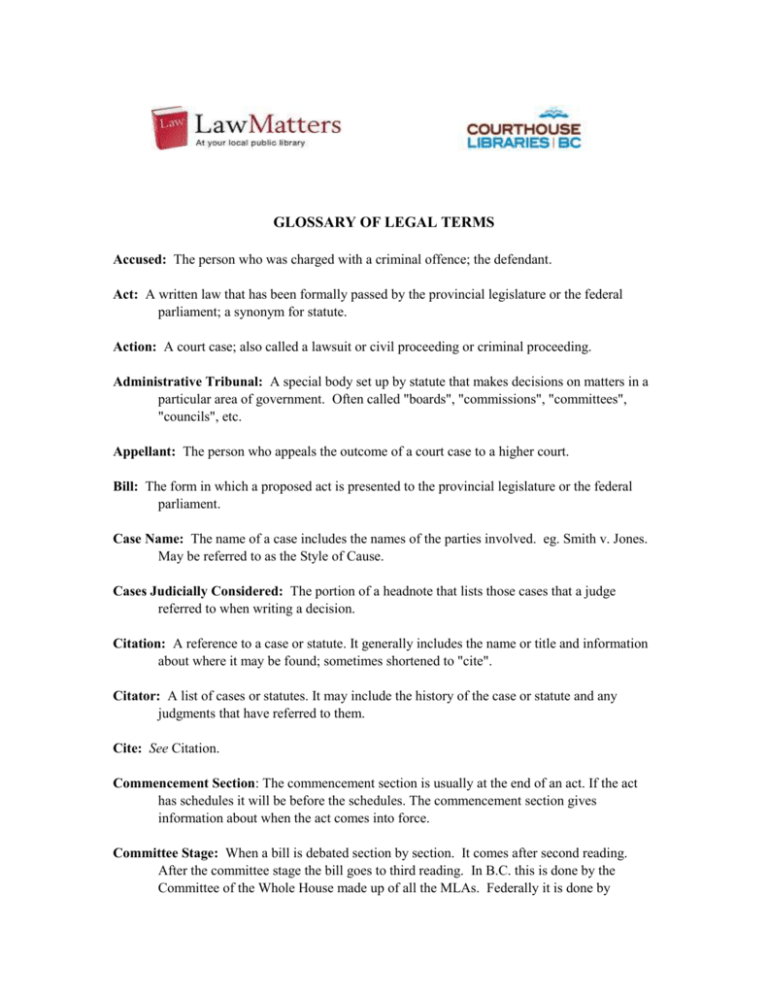
GLOSSARY OF LEGAL TERMS Accused: The person who was charged with a criminal offence; the defendant. Act: A written law that has been formally passed by the provincial legislature or the federal parliament; a synonym for statute. Action: A court case; also called a lawsuit or civil proceeding or criminal proceeding. Administrative Tribunal: A special body set up by statute that makes decisions on matters in a particular area of government. Often called "boards", "commissions", "committees", "councils", etc. Appellant: The person who appeals the outcome of a court case to a higher court. Bill: The form in which a proposed act is presented to the provincial legislature or the federal parliament. Case Name: The name of a case includes the names of the parties involved. eg. Smith v. Jones. May be referred to as the Style of Cause. Cases Judicially Considered: The portion of a headnote that lists those cases that a judge referred to when writing a decision. Citation: A reference to a case or statute. It generally includes the name or title and information about where it may be found; sometimes shortened to "cite". Citator: A list of cases or statutes. It may include the history of the case or statute and any judgments that have referred to them. Cite: See Citation. Commencement Section: The commencement section is usually at the end of an act. If the act has schedules it will be before the schedules. The commencement section gives information about when the act comes into force. Committee Stage: When a bill is debated section by section. It comes after second reading. After the committee stage the bill goes to third reading. In B.C. this is done by the Committee of the Whole House made up of all the MLAs. Federally it is done by committees made up of groups of MPs. Committees may propose changes to a Bill. Common Law: The system of law based on previous court decisions. Consolidated Acts or Regulations: A version of a statute or regulation in which amendments have been blended into the original and are current to a particular date. Court Registry: Each courthouse has a registry which keeps all of the documents regarding the cases that happen in that courthouse. It is where people file the papers to begin a court action and any other material required by their case. Court Rules: The rules an individual is required to follow when conducting a case before a judge or judge and jury. In B.C. the court rules are regulations made under the Court Rules Act . Each court level has their own rules for example; Small Claims Rules, Supreme Court Rules and Court of Appeal Rules. Defendant: The person being sued: also a person charged with a criminal offence. Digest: A summary of a case. First Reading: The formal introduction of a bill in parliament or the provincial legislature. Followed by Second Reading, the Committee Stage, Third Reading and Royal Assent. Government Bill: A Bill introduced by a Minister in the current government. For each session in B.C. these bills are numbered sequentially starting with number 1. Hansard: Printed record of the debates of the Legislative Assembly or Parliament. Headnote: The editorially prepared summary and index terms that appear before the reasons for judgment in a published law report. In Force: Refers to the day on which an act or regulation comes into effect. Judgment: The decision of a court in a legal proceeding. May also be called reasons for judgment, decision, or case. Jurisdiction: The geographical area within which a court has the right to operate; also the subjects about which a court has the right and power to render judgment. Law Report: A publication in which reasons for judgment are published. Only 10% of judgments are published. Legislation: A general term used for the law created by a government. eg. acts and regulations. Local Act: An act which pertains only to a particular municipality. Similar to Private Acts. They are not generally included in consolidations. Member's Bill: A member's bill is introduced by an individual member of the legislature, it is not sponsored by the government. For each session in B.C. they are numbered sequentially starting with the number M201. Note Up: To determine whether a judgment has been referred to in subsequent decisions or whether an act has been referred to in a judgment. Order in Council: A decision issued by the Cabinet concerning the operation of the government. Party: The plaintiff or defendant in a legal action. Petitioner: A synonym for plaintiff. Plaintiff: The person who sues or who commences a legal action. Precedent: A sample document that is used as an example for drafting a similar document, sometimes referred as a form. Also a judgment that serves as an example for other cases. Private Act: An act which only pertains to persons, corporations or charitable institutions. They are not generally included in consolidations. Private Bill: A bill which is introduced under the sponsorship of an MLA and pertains to a particular person or group. For each session in B.C. they are numbered sequentially starting with number Pr401. Proclamation: An official announcement that a statute or sections of a statute are in force on a particular date. Currently the mechanism for proclaiming acts into force is a regulation. Public Act: A statute that pertains to public affairs. See also Government Bill. Public Bill: A bill introduced by a Minister in the current government. Generally referred to as a Government Bill. Reasons for Judgment: The decision of a court in a legal proceeding. May also be called a judgment, decision or case. Registry: See Court Registry. Regulations: A type of subordinate legislation for carrying out the purposes of a statute. B.C. regulations are published in the British Columbia Gazette Part II.. They are abbreviated as B.C. Reg. followed by a number and the year, eg. B.C. Reg.10/2008. The federal government’s regulations are published in the Canada Gazette Part II and are abbreviated as SOR followed by the year and a number. eg. SOR/2007-279. Respondent: The person against whom an appeal is brought or a motion is filed. Revised Statues: Periodically the public acts are revised to consolidate amendments, simplify the numbering and update the language. In B.C. the last revision was in 1996. In citations it is abbreviated R.S.B.C. 1996. The last revision for the federal statutes was 1985, abbreviated as R.S.C. 1985. Royal Assent: The crown's representative assents to a bill passed by a legislative body. Once a bill receives Royal Assent it is an act. Second Reading: The second stage of the legislative process when the principle of a Bill is debated. The next stage is the Committee Stage. Session: The legislative sittings of each government are divided into sessions. In B.C. there is generally one session per year. Sessional Volume: A hard cover volume containing all the statutes published in a session of a legislative body. May also be referred to as an annual statute volume. The abbreviation used for B.C. statute volumes is S.B.C. and the year. eg. S.B.C. 2008. The abbreviation used for federal statute volumes is S.C. and the year. Statute: An act of parliament or a provincial legislature. Alternate term for act. Statute Citator: A list of statutes which indicates subsequent amendments and/or cases that have referred to the statutes. Statutes Judicially Considered: The portion of a headnote that lists those statutes that have been referred to in the reasons for judgment. Statutory Instruments: Similar to Statutory Orders and Regulations. Abbreviated as SI followed by the year and a number. eg. SI/2007-106. They are published in the Canada Gazette Part II. Statutory Orders and Regulations: Federal regulations and proclamations. Abbreviated as SOR followed by the year and a number. eg. SOR/2007-279. They are published in the Canada Gazette Part II. Style of Cause: That part of a case citation to a case that contains the names of the parties. eg. Smith v. Jones or R. v. Smith Subordinate Legislation: Legislation made by a body (eg. government ministry or municipality) The power to make this type of legislation is granted to the body by a statute. Examples: regulations, orders in council and bylaws. Table of Cases: Alphabetical list of cases reported, digested or mentioned in a publication. Third Reading: The final vote on a Bill. The next stage is Royal Assent. Transcript: A written record of everything that was said in the courtroom during a trial. Treatise: A comprehensive book on a legal subject; a textbook. Words and Phrases: A publication similar to a dictionary. They define words and phrases by giving actual quotations from cases and/or statutes. Note: The online database QP LegalEze [free access from all BC public libraries] also has a concise legal glossary available from the home page: http://www.qplegaleze.ca
